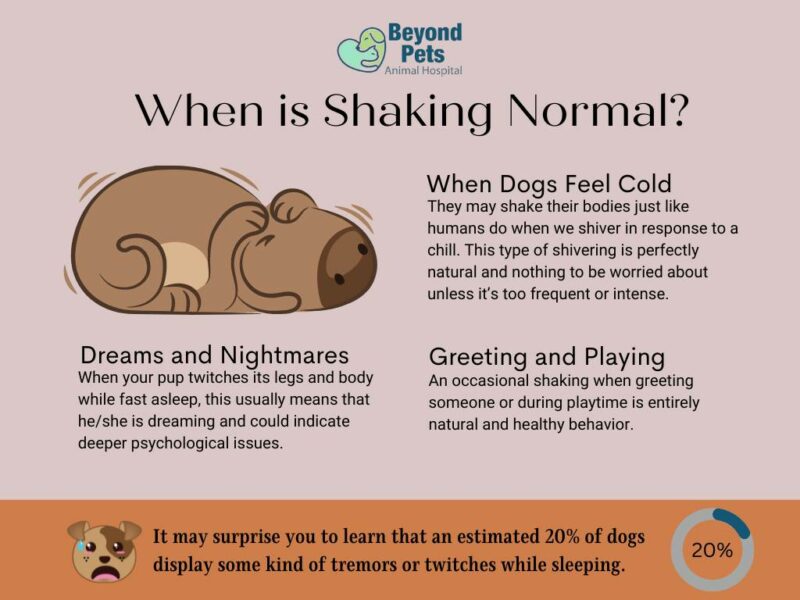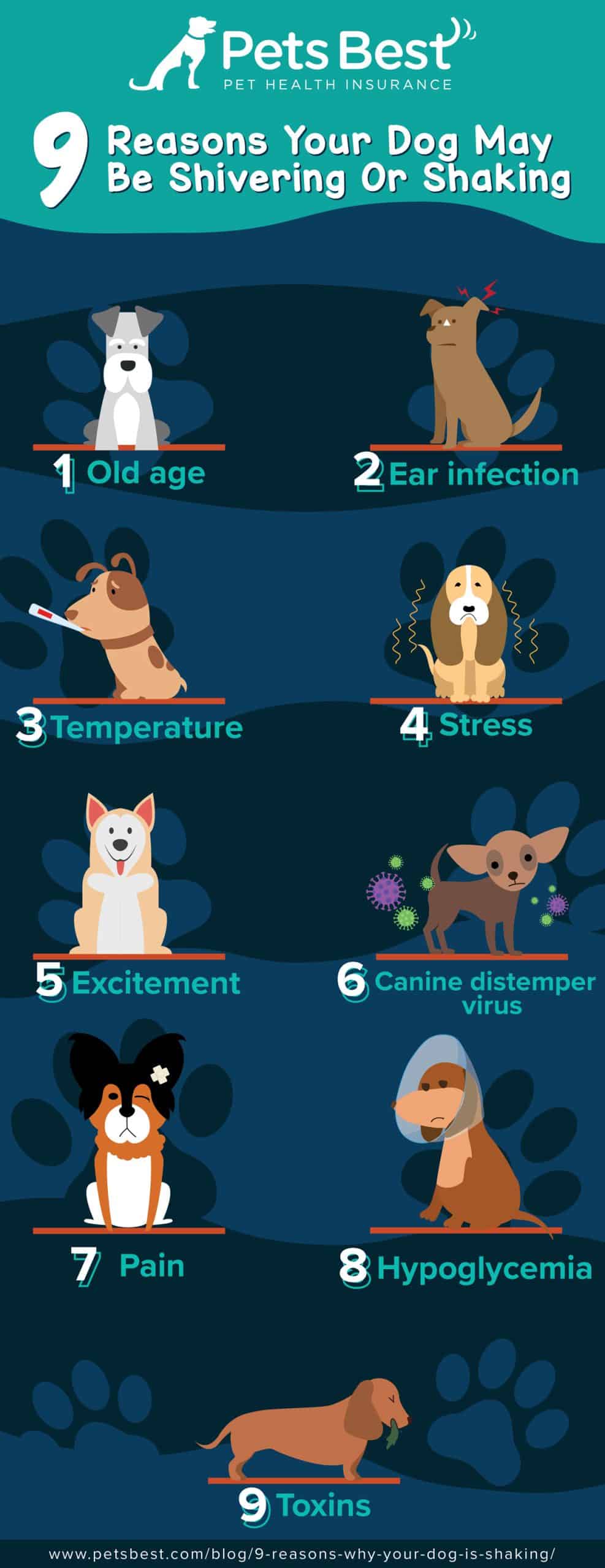Have you ever noticed that your puppy starts shaking after a meal? If so, you may be wondering why this is happening. In this article, we will explore the phenomenon of post-eating tremors in puppies, helping you understand what might be causing your furry friend's shaking episodes. By gaining a deeper understanding of this behavior, you can ensure that your puppy stays happy and healthy. So, let's dive into the world of post-eating tremors and find out why your puppy is shaking after meals!
Potential Causes of Post-Eating Tremors
Post-eating tremors in puppies can be caused by various factors. Understanding these potential causes can help you identify the root of the issue and seek appropriate treatment. Some possible causes of post-eating tremors in puppies include:
Hypoglycemia
Hypoglycemia, or low blood sugar, is a common cause of post-eating tremors in puppies. When a puppy's blood sugar level drops after a meal, it can lead to shaking or trembling. This condition is especially common in small breed puppies and those with high metabolic rates. If your puppy experiences frequent post-meal tremors, it is important to have their blood sugar levels checked by a veterinarian.
Stress or Excitement
Puppies are often full of energy and can become stressed or excited during mealtime. This heightened state of emotions can sometimes manifest as post-eating tremors. If your puppy is shaking after meals, try to create a calm and quiet environment during feeding time to reduce stress and excitement.
Cold or Overheating
Extreme temperatures can also trigger post-eating tremors in puppies. If your puppy is too cold or too hot while eating, their body may react by shaking or trembling. Ensure that the feeding area is at a comfortable temperature and provide appropriate warmth or cooling if necessary.
Food Allergies or Sensitivities
Food allergies or sensitivities can cause various symptoms in puppies, including post-eating tremors. If your puppy is shaking after meals, it may be worth investigating if they have any food allergies or intolerances. Keeping a food diary and consulting with a veterinarian can help determine if certain ingredients are causing an allergic reaction.
Digestive Issues
Digestive issues, such as gastrointestinal upset or inflammation, can sometimes lead to post-meal shaking in puppies. If your puppy experiences other symptoms such as vomiting, diarrhea, or loss of appetite along with the tremors, it could indicate a digestive issue. Consult with a veterinarian to address any underlying digestive problems.
Symptoms and Signs of Post-Eating Tremors
Recognizing the symptoms and signs of post-eating tremors in puppies is crucial for proper diagnosis and treatment. Here are some common symptoms to look out for:
Visible Shaking or Trembling
One of the most obvious signs of post-eating tremors is visible shaking or trembling in your puppy. If you notice your puppy's body visibly shaking or trembling after meals, it may be an indication of an underlying issue.
Lack of Coordination or Balance
Post-eating tremors can affect a puppy's coordination and balance. If your puppy seems unsteady, has difficulty walking, or appears clumsy after eating, it could be a sign of post-meal tremors.
Excessive Panting or Drooling
Excessive panting or drooling after meals can accompany post-eating tremors in puppies. If your puppy is excessively panting or drooling along with shaking after eating, it may indicate a problem.
Lethargy or Weakness
If your puppy becomes lethargic or weak after meals, it could be a symptom of post-eating tremors. Pay attention to any changes in your puppy's energy levels or overall weakness after eating.
Loss of Appetite or Vomiting
A loss of appetite or vomiting following meals can be a sign of post-eating tremors. If your puppy consistently refuses to eat or vomits after meals, it is essential to seek veterinary assistance.

This image is property of img.beyondpets.com.
When to Seek Veterinary Assistance
While occasional post-eating tremors may not always require immediate veterinary attention, certain situations warrant a trip to the veterinarian. It is important to be aware of the following circumstances:
Persistent or Worsening Tremors
If your puppy's post-eating tremors persist or worsen over time, it is advisable to consult with a veterinarian. Persistent tremors could indicate an underlying health issue that requires medical intervention.
Accompanied by Other Concerning Symptoms
If your puppy experiences additional concerning symptoms along with post-eating tremors, such as diarrhea, fever, or difficulty breathing, it is crucial to seek veterinary assistance. These symptoms may indicate a more significant problem that needs to be addressed promptly.
If the Puppy is not Eating or Drinking
A lack of appetite or refusal to drink water after meals is a cause for concern in puppies. If your puppy consistently avoids eating or drinking, it is recommended to consult a veterinarian to rule out any underlying health issues.
If the Tremors are Interfering with Daily Activities
If your puppy's post-eating tremors are severe enough to interfere with their daily activities or quality of life, it is crucial to seek veterinary assistance. Tremors that inhibit their ability to walk, play, or perform regular tasks should not be ignored.
Puppy is Very Young or has Other Underlying Health Conditions
If your puppy is very young or has additional underlying health conditions, it is essential to seek veterinary assistance for post-eating tremors. Young puppies and those with pre-existing health issues may be more prone to serious complications and require special care.
Diagnostic Process for Post-Eating Tremors
When you visit a veterinarian for post-eating tremors in your puppy, the diagnostic process typically involves several steps to determine the underlying cause. These may include:
Physical Examination
The veterinarian will perform a thorough physical examination of your puppy, including assessing their body condition, checking for any abnormalities, and evaluating their overall health.
Blood Tests
Various blood tests, including a complete blood count (CBC) and blood chemistry panel, may be performed to check for any abnormalities or imbalances that could be contributing to the tremors.
X-rays or Imaging
In some cases, X-rays or other imaging techniques may be advised to evaluate the puppy's bones, muscles, or internal organs for any abnormalities that could be causing the tremors.
Food Trials or Elimination Diets
If food allergies or sensitivities are suspected, your veterinarian may recommend food trials or elimination diets to identify and eliminate any potential allergens from your puppy's diet.
Additional Tests as Necessary
Depending on the initial findings, additional tests such as urine analysis, fecal examination, or hormonal testing may be conducted to gather more information about your puppy's health and pinpoint the cause of the post-eating tremors.

This image is property of imageserver.petsbest.com.
Treatment Options for Post-Eating Tremors
Treatment for post-eating tremors in puppies will depend on the underlying cause identified during the diagnostic process. Some treatment options that may be recommended by your veterinarian include:
Adjusting the Feeding Routine
In some cases, adjusting the feeding routine can help alleviate post-eating tremors. Your veterinarian may recommend dividing meals into smaller, more frequent feedings or ensuring a consistent feeding schedule to maintain stable blood sugar levels.
Managing Stress or Anxiety
If stress or anxiety is contributing to the post-eating tremors, implementing techniques to manage these emotions can be beneficial. This can include creating a calm environment during mealtime, incorporating mental stimulation, or using calming aids or supplements.
Providing a Balanced Diet
Feeding your puppy a balanced and nutritious diet is crucial for overall health and may help reduce post-eating tremors. Consult with your veterinarian to ensure your puppy's diet meets their specific nutritional needs.
Medications or Supplements
In some cases, your veterinarian may prescribe medications or recommend supplements to alleviate the post-eating tremors. These medications or supplements might aim to address underlying issues such as low blood sugar, inflammation, or anxiety.
Supportive Care and Monitoring
Supportive care and close monitoring may be necessary depending on the severity of the post-eating tremors. This may involve regular check-ups with your veterinarian, providing a comfortable environment, and closely observing any changes or improvements.
Preventing Post-Eating Tremors
While not all post-eating tremors can be prevented, there are steps you can take to minimize the likelihood of them occurring in your puppy:
Ensuring a Calm and Comfortable Feeding Environment
Create a calm and comfortable feeding environment for your puppy by minimizing distractions and loud noises. Establishing a routine and providing a quiet space for meals can help reduce stress and anxiety.
Feeding a High-Quality Diet
Feeding your puppy a high-quality, nutritious diet is essential for their overall health. Consult with your veterinarian to determine the best diet for your puppy's specific needs.
Avoiding Allergenic Foods
If your puppy has known food allergies or sensitivities, it is crucial to avoid feeding them foods that trigger allergic reactions. This may involve reading ingredient labels carefully or consulting with your veterinarian to determine suitable allergen-free options.
Regular Exercise and Mental Stimulation
Regular exercise and mental stimulation are essential for a healthy and happy puppy. Engaging in activities that promote physical exercise and mental enrichment can help reduce stress and anxiety, potentially minimizing post-eating tremors.
Regular Veterinary Check-ups
Scheduling regular veterinary check-ups for your puppy is important for overall health and well-being. Routine examinations can help detect any potential issues early on, allowing for prompt treatment and management.

This image is property of windermerevetservices.com.
Conclusion
Post-eating tremors in puppies can be caused by various factors, including hypoglycemia, stress, food allergies, and digestive issues. Recognizing the symptoms and knowing when to seek veterinary assistance is vital for proper diagnosis and treatment. Through a thorough diagnostic process and appropriate treatment options, post-eating tremors can be managed or reduced. By implementing preventive measures, such as providing a calm feeding environment and a balanced diet, you can help minimize the occurrence of post-eating tremors and ensure your puppy's overall health and well-being. Remember to consult with a veterinarian for personalized advice and guidance specific to your puppy's needs.


